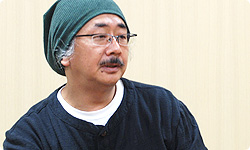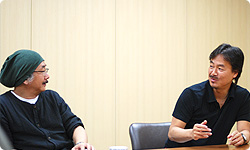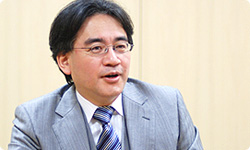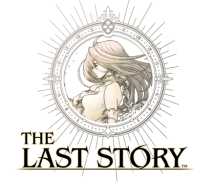3. ''This is All Wrong!''
With Sakaguchi-san taking on such a huge challenge with The Last Story, I would imagine that what he was looking for from the music differed from previous projects. I’ve heard that you had a pretty tough time meeting these demands, Uematsu-san. Could you tell me a bit more about that?
Certainly. For the first time in a long time, I found myself on the wrong track and really had a tough time of it. When Sakaguchi-san spoke with me about the project, I accepted readily, saying that if he would have me, I’d do it. He asked me to start work on the main theme song, the battle music, and the music for the town. I went about working on it in the usual way and presented it to him… And that’s when I got back this really, really long email basically telling me: ‘This is all wrong!’
(laughs)
So he didn’t just tell you that you were on the wrong track. He told you that it was all wrong! (laughs)
The email went straight into it: ‘This is all wrong!’ (laughs)
And the email went on at length after that.
Right. He started by telling me what he wanted to achieve with this game, and concluded by telling me to do it again. I thought: ‘Okay. This is serious.’ But I had no choice but to take it on the chin. (laughs) I had to completely discard all of the ideas that I had about The Last Story.
Sakaguchi-san put it so clearly that, in one fell swoop, he had rendered all the ideas and imagery you had about The Last Story unusable.
That’s right. And then when I thought about where I’d gone wrong, I concluded that it was because Sakaguchi-san had set himself a whole new challenge. I understood that he had no desire to continue making RPGs along the same lines as what had come before.

So there was a desire to achieve things that could not be done by simply sticking to the old formula. And that’s where the challenge lay for this project.
Right. With titles that I’d worked on up to then, such as FF, Lost Odyssey7 and Blue Dragon8, I was conscious that they were very much in the classic RPG mould. But I knew that this wouldn’t do this time round. It wasn’t just a matter of creating a different style of music. I knew that I would need to go about fundamentally changing the way I approached the task. 7 Lost Odyssey is an RPG developed by Mistwalker and released in Japan in December 2007. Hironobu Sakaguchi: oversaw the project as the producer. 8 Blue Dragon is an RPG developed by Mistwalker and released in Japan in December 2006.
So you realised that you would have no choice but to bite the bullet and press the reset button on the approach you had developed together over twenty-five years of collaboration.
Yes, I had to bite the bullet. I really felt I’d managed to get myself into some pretty deep water with this project… (laughs)
When you read my email, I imagine you felt that I should have told you in the first place if that’s the case! (laughs)
Well, yes. And so I got another month to rework everything.
The battle music was especially tough, wasn’t it? I completely overhauled the battle system with this title, putting the focus on having the action unfold in real time. That meant that I wanted the music to have that same kind of immediacy. But I didn’t actually know how one would go about conveying a ‘real time’ feel through the music, so we had no choice but to both take a trial-and-error approach.
In a regular RPG, the music used for battles that take place in the field is generally a short piece. It doesn’t take long to defeat enemies, so the music will rarely be more than a thirty-second loop. But I had a feeling that this wouldn’t be the case this time round…
So the new approach to the system side of things also entailed a radically new approach to the music, meaning you had no choice but to throw away the old rulebook and start afresh.
That’s right. So I ended up rewriting the battle theme and making it much longer. I’d say it ended up being around five minutes long…
That’s right. It ended up being far longer than I’d imagined. (laughs) And the melody even changed part-way through, so it was like a symphony, composed of three different movements. Basically, Uematsu-san came back to me with something that was really out of the ordinary. (laughs)
We ended up getting the dev team to edit it, dividing it up so that separate sections would be used in different battle situations. Composing that music was a real challenge.
Working on that battle music let you see what my vision for the game was. But do you remember that when you sent that music, it came with an email saying: ‘If this isn’t what you’re after, I think it’s best if I bow out of the project’?
Really? Is that right? Ha, it seems I was really taking things seriously. (laughs)
You mean you don’t remember? I’ll forward it to you later! (laughs)

To think that after all the trials and tribulations you’ve come through together over the last twenty-five years, you would have an exchange like that! It’s all rather dramatic.
I’m sure I said that because I felt confident about the reworked music I’d come up with.
Or to put it the other way round, if I rejected this music, then it would prove that you just didn’t share my vision for the game. Actually, I’ve got a bit of a confession to make. When I replied to that email, I actually mistakenly forwarded it to the entire dev team.
Hey! (laughs)
Everyone was up in arms. They were asking me: ‘Sakaguchi-san, what’s going on? Is Uematsu-san really going to quit?’ It caused quite a commotion, let me tell you! (laughs) So the whole staff basically knew what was going on. (laughs)
Is that true? (laughs) It all got rather serious, didn’t it?
But in all the time you’ve worked together, that kind of incident has been extremely rare, hasn’t it?
It had certainly been a long time since something like that had happened. When you’ve worked in the industry for over twenty years, you learn to keep things to yourself, even if you’re not always completely happy.
And it’s also unpleasant for the person that’s pointing out problems with something.
Right. I think when I got that email from Sakaguchi-san telling me that I’d got it all wrong, it made me realise how important it was never to take things for granted, or forget the innocence and openness you have when you start out. I think I might have lost sight of that, and forgotten what it was like to embark on a new challenge.
I’d imagine it had been quite some time since you’d experienced that kind of negative response.
Indeed it had. I mean, this was an outright rejection. (laughs)
The reworked music you sent was totally different from the first piece you sent.
Well, I’d been on completely the wrong track.
That’s why I had no choice but to write that mail.
No, it’s fine. I mean, in the end, I think it really helped me. It would have ended up being really unclear if you’d just told me: ‘This part is good, but I’d like you to change this part’.
That would have entailed a compromise in your vision for the game. It was precisely because Sakaguchi-san delivered such a damning judgment that it allowed you to make that next step.

But as you can imagine, we were really on edge for that month.
Receiving a total rejection like that must have been hard for Uematsu-san, but it must also have been very hard for you, Sakaguchi-san. After all, you had to reject something which you knew Uematsu-san had put his heart and soul into.
Right. It was a long month. I was actually worried I wouldn’t get a reply to that email…
Oh, you didn’t have to worry about that! (laughs) During the course of that month, I really focused and came up with a lot of ideas. I knew from experience that these ideas were unlikely to be rejected.
You really didn’t hold back in those first five minutes of the battle music, with all those elements you put into it.
I’m sure you got a sense of how much Uematsu-san had put into it. I really envy the relationship you have, which allows you to have this kind of exchange.
Well, if you just take this episode as an example, it looks like we make quite a partnership, doesn’t it? (laughs)
Even leaving this episode aside, I’ve got no doubt that you make a great team! (laughs)
